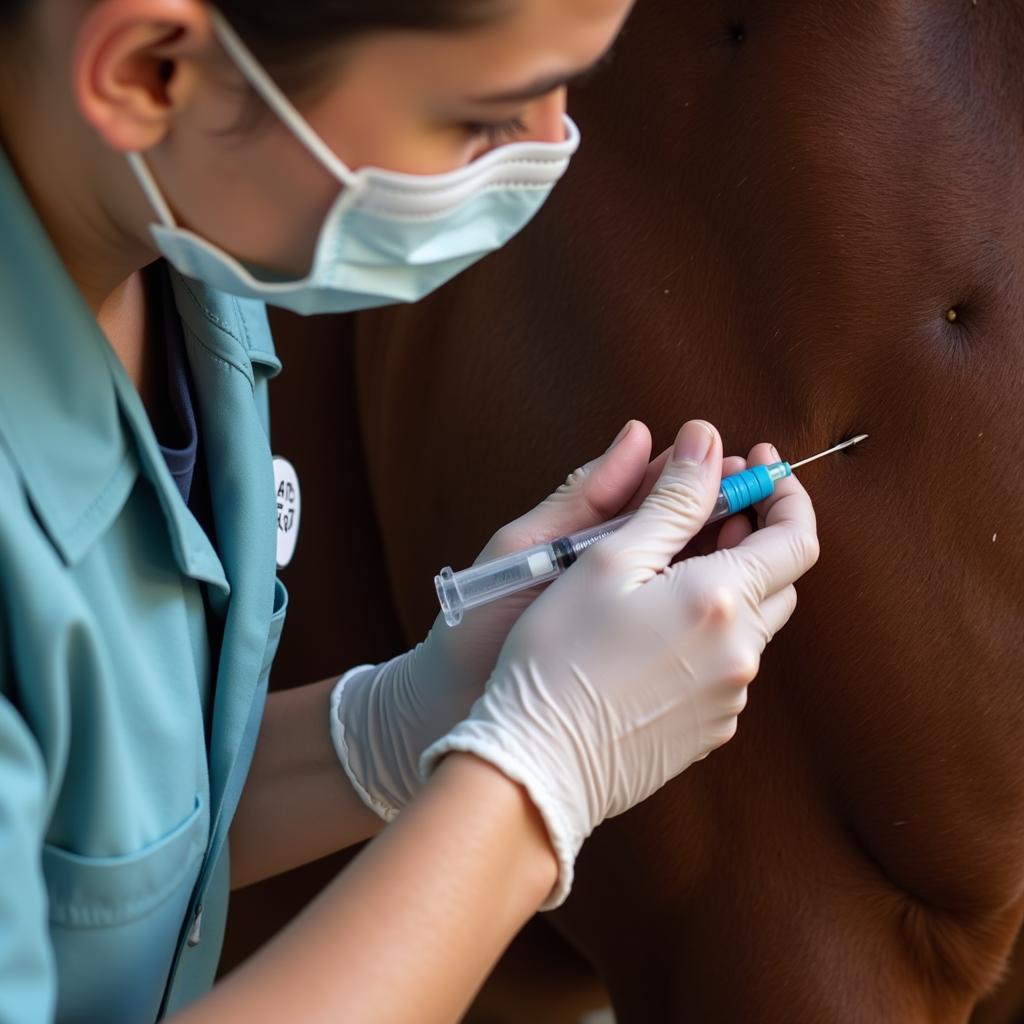Horse Joints are crucial for movement, performance, and overall well-being. Understanding their complex structure and function is key to providing effective care and preventing potential problems. This article delves into the intricacies of horse joints, offering valuable insights for every horse owner.
Equine joints are complex structures that allow for a wide range of motion while bearing substantial weight. These joints are susceptible to wear and tear, making proper care and maintenance essential. Factors like age, activity level, and genetics can all influence the health of your horse’s joints. Early detection and appropriate management are vital for preserving their mobility and comfort. Just after the introduction, let’s explore the anatomy of these vital structures. You can find more about horse joint anatomy at our dedicated page: horse joints anatomy.
The Intricate Anatomy of Horse Joints
A horse’s joints are composed of bone, cartilage, synovial fluid, ligaments, and tendons. Cartilage cushions the bones, while synovial fluid lubricates the joint, allowing for smooth movement. Ligaments connect bones to other bones, providing stability, while tendons attach muscles to bones, facilitating movement.
Common Joint Issues in Horses
Just like humans, horses can suffer from various joint problems, including arthritis, osteoarthritis, and injuries like sprains and strains. These conditions can cause pain, stiffness, and lameness, significantly impacting a horse’s quality of life and athletic performance.
Recognizing the signs of joint problems is crucial for early intervention. Symptoms can range from subtle stiffness to obvious lameness. Changes in gait, reluctance to move, and swelling or heat around the joint are all warning signs that should not be ignored. If you notice any of these signs, it’s important to consult with a veterinarian for a proper diagnosis and treatment plan.
Supporting Horse Joint Health
Maintaining optimal horse joint health requires a multifaceted approach encompassing nutrition, exercise, and preventative care. A balanced diet rich in essential nutrients is the foundation of healthy joints. Providing adequate amounts of vitamins, minerals, and antioxidants helps support cartilage health and reduces inflammation. Consider adding a supplement like osteo max horse supplement to further support your horse’s joint health.
The Role of Exercise and Supplementation
Regular, controlled exercise is essential for maintaining joint flexibility and strength. However, it’s important to avoid overexertion, especially in young or older horses. Appropriate warm-up and cool-down periods are vital for minimizing the risk of injury. Protective gear, such as fetlock boots horses, can offer additional support and protection during exercise. Certain medications, such as librela for horses, can also be prescribed by a veterinarian to manage pain and inflammation associated with joint problems.
“Early intervention is key when it comes to horse joint health,” says Dr. Emily Carter, DVM, a renowned equine veterinarian. “Addressing issues promptly can significantly improve long-term outcomes and maintain the horse’s quality of life.”
Natural Remedies for Joint Support
Many horse owners are exploring natural remedies for supporting their horse’s joint health. Turmeric, for instance, is a popular option due to its anti-inflammatory properties. You can learn more about its use in our article on turmeric for horse. Remember, while natural remedies can be beneficial, it’s crucial to consult with your veterinarian before incorporating them into your horse’s regimen.
 Horse Receiving Joint Injection
Horse Receiving Joint Injection
“In my experience, a combination of conventional veterinary care and natural remedies can provide the most comprehensive approach to managing joint health in horses,” adds Dr. Carter. “It’s all about finding the right balance for each individual horse.”
In conclusion, horse joints are complex structures that require diligent care and attention. By understanding the factors that influence joint health and implementing proactive strategies, horse owners can significantly contribute to the long-term well-being and soundness of their equine companions. Remember to prioritize regular veterinary checkups, a balanced diet, appropriate exercise, and early intervention for any signs of joint issues.
FAQ
- What are the most common signs of joint problems in horses?
- How can I support my horse’s joint health through nutrition?
- What type of exercise is best for maintaining joint flexibility?
- Are there any natural remedies that can help with joint pain?
- When should I consult a veterinarian about my horse’s joints?
- What are some common joint supplements for horses?
- How can I prevent joint injuries in my horse?
You might also be interested in reading more about horse joint injections or equine arthritis.
Need help with your horse’s joint health? Contact us! Phone: 0772127271, Email: [email protected] or visit us at QGM2+WX2, Vị Trung, Vị Thuỷ, Hậu Giang, Việt Nam. We have a 24/7 customer service team.